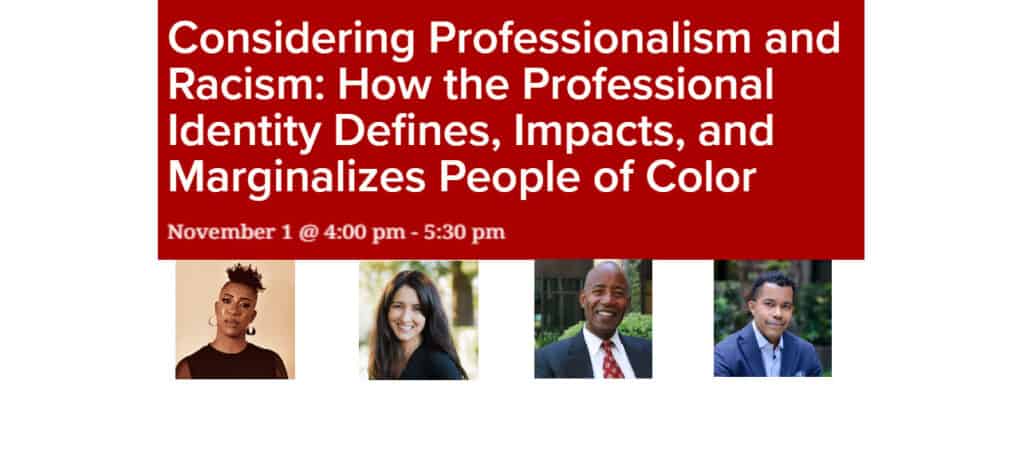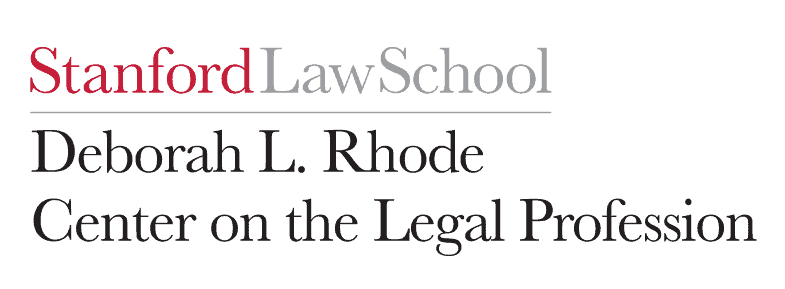Prompted by Leah Goodridge’s recent essay in the UCLA Law Review which “examines professionalism as a tool to subjugate people of color in the legal field,” the Rhode Center was proud to host a discussion illuminating how racial hierarchy and inequity operates within the legal profession—impacting not only attorneys and paralegals but also citizens participating in the legal process.
Leah Goodridge, a nationally renowned movement lawyer, thought leader, writer and current Managing Attorney for Housing Policy at Mobilization for Justice in New York City, started her presentation with the observation that just 5% of the attorneys in the United States are African American. Over her decade of experience in the legal field, she has seen how the standards of professionalism are not applied equally across all lawyers. In particular, Goodridge has both observed and experienced professional norms applied to people of color and other marginalized groups to police, constrain, and undermine their participation in the field. Specifically, Goodridge has identified three characteristics of professionalism deployed as a tool for marginalization. First, the bias and discrimination threshold concept notes how professionalism demands that people of color and other marginalized groups accept racism and bias with grace and lightheartedness, requiring them to “play the game” and act unbothered when faced with discriminatory behavior by colleagues. Second, the selective offense characteristic normalizes racist, misogynistic, ableist, or otherwise discriminatory behavior but allows for the dominant group to take offense at those who denounce or dispute discriminatory behavior. And third, the reasonable person standard, or reasonable professional standard, labels the marginalized identity, whether by race, gender, sexual orientation, or ability, as unreasonable and unprofessional.
Goodridge’s opening comments and the article itself were then discussed in depth with the panel: Misasha Suzuki Graham, practicing litigator and co-author and co-host of Dear White Women; Ron Tyler, Professor of Law and Director of the Criminal Defense Clinic at Stanford Law School; and moderator Richard Thompson Ford, Professor of Law at Stanford Law School.
 Professor Ford asked the group: When do you speak up and how? Goodridge emphasized the importance of building your own support system –to identify and build relationships with people who are not going to reinforce dehumanization just because that was what they were taught or experienced. Graham noted that she had found success in her work with pausing and asking the simple question: Why do you think/say that?
Professor Ford asked the group: When do you speak up and how? Goodridge emphasized the importance of building your own support system –to identify and build relationships with people who are not going to reinforce dehumanization just because that was what they were taught or experienced. Graham noted that she had found success in her work with pausing and asking the simple question: Why do you think/say that?
Ford then asked what professional norms need to be reconsidered in the light of their racial implications. Professor Tyler observed that since the professional standard is white male, anything that deviates from that is less than acceptable. Communication styles, hairstyles, clothing, and the acceptability of body art are examples of aspects of professionalism. Professor Tyler encouraged the audience to think about who sets the norm? Who is applying the standard and how?
A key to being a professional is knowing how to treat other people and show up for them in the workplace. When issues such as these emerge, the panelists noted the importance of first naming the issue and then questioning the standard of professionalism. Moving beyond a white-centered view of the impact of racism, it would be valuable to get input from all impacted communities to arrive at a better standard. But, professionalism and bias are intertwined with power – so unearthing these power dynamics is a vital step in moving toward a professional standard that incorporates intolerance of racism in any form.
Finally, the panelists considered the pace of change in the law profession to move beyond racism. They noted that we are relitigating social norms, and the law is moving slowly. Should we push gently or move toward big changes? It is important to challenge these norms. Ron noted that bigger changes are possible when you are the decision-maker. In the meantime, when confronted with biases or outdated ideas of professionalism, name it and contextualize it. Someone in the room, not just a person of color, flagging it can move the organization forward.
This thought-provoking conversation with Leah, Misasha Suzuki Graham, Professor Ron Tyler, and Professor Richard Ford was hosted by the Deborah L. Rhode Center on the Legal Profession, the Stanford Center for Racial Justice, and the John and Terry Levin Center for Public Service and Public Interest Law. This event was co-sponsored with the Black Law Students Association, Asian and Pacific Islander Law Students Association, Native American Law Students Association, Black Business Student Association, and Stanford American Indigenous Medical Students.
